

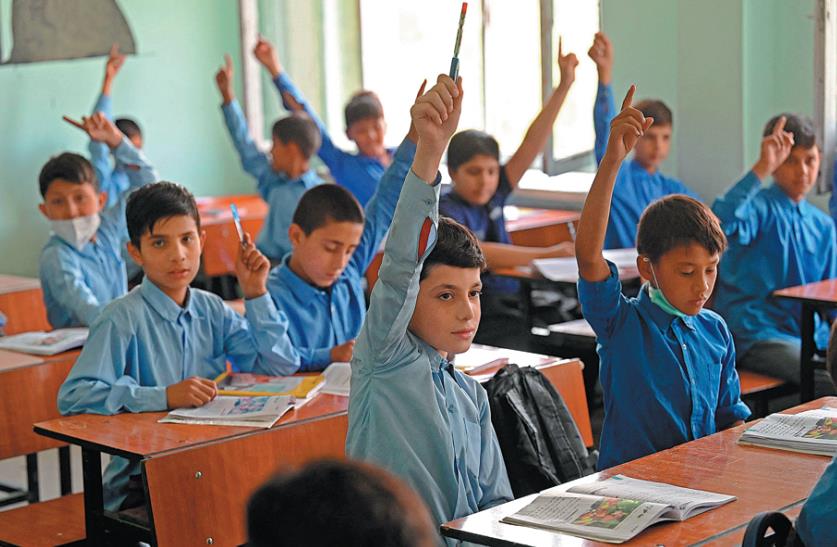
At airport, leaders vow security while China reminds of threats from terrorism
The Taliban marched triumphantly into Kabul's international airport on Tuesday, hours after the United States' final troop withdrawal that ended its longest war. Standing on the tarmac, Taliban leaders pledged to secure the country, quickly reopen the airport and grant amnesty to former opponents.
In a show of control, turbaned Taliban leaders were flanked by the group's elite Badri unit as they walked across the tarmac. The commandos in camouflage uniforms proudly posed for photos.
Getting the airport running again is just one of the sizable challenges the Taliban face in governing a nation of 38 million people that for two decades had survived on billions of dollars in foreign aid, The Associated Press said.
"Afghanistan is finally free," Hekmatullah Wasiq, a top Taliban official, said on the tarmac. "The military and civilian side (of the airport) are with us and in control. Hopefully, we will be announcing our Cabinet. Everything is peaceful. Everything is safe."
Wasiq also urged people to return to work and reiterated the Taliban pledge offering a general amnesty. "People have to be patient," he said. "Slowly we will get everything back to normal. It will take time."
Pakistan's Foreign Minister Shah Mahmood Qureshi said on Tuesday in Islamabad that Afghanistan will form a government within days, Reuters reported.
Just hours earlier, the US military had wrapped up its largest airlift of noncombatants in history.
Chinese Foreign Ministry spokesman Wang Wenbin said on Tuesday that the US withdrawal shows that the policy of carrying out reckless military interference and imposing its own values and social systems on other countries is doomed to fail.
"Getting rid of foreign military occupation, now the Afghan people are ushering in a new start for national peace and reconstruction, turning a new page of the country's history," Wang told reporters in Beijing.
Friendly policy
He said China always respects Afghanistan's sovereignty, independence and territorial integrity, adheres to noninterference in the country's internal affairs and pursues a friendly policy toward the Afghan people.
China will continue to keep close communication and coordination with all parties in Afghanistan as well as the international community to provide support and assistance within its ability for the country to restore peace, revive the economy and crack down on all terrorist organizations, including the East Turkestan Islamic Movement, Wang said.
On Tuesday morning, signs of the chaos of recent days were still visible. In the terminal, rifled luggage and clothes were strewed across the floor, alongside wads of documents. Concertina wire stills separated areas while overturned cars and parked vehicles blocked routes around the civilian airport-a sign of measures taken to protect against possible suicide car bombers entering the facility.
Taliban spokesman Zabihullah Mujahid addressed the gathered members of the Badri unit. "I hope you be very cautious in dealing with the nation," he said. "Our nation has suffered war and invasion and the people do not have more tolerance."
In an interview with Afghan state television, Mujahid also discussed restarting operations at the airport, which remains a key way out for those wanting to leave the country.
The airport had been chaotic since the Taliban took Kabul on Aug 15.
Last week, an Islamic State suicide attack at an airport gate killed 170 Afghans and 13 US service members. Some survivors have raised the possibility that a number of Afghan people were actually killed by US fire amid the chaos and confusion instead of by the bombing.
The 20-year war has claimed the lives of more than 2,400 US citizens.
Its frantic conclusion and purpose are expected to generate much soul-searching and calls for congressional investigations as another US intervention ends in disarray.
'Devastating' withdrawal
"Consequences for the US are good-it finally cut its loss. But for Afghanistan, the war and the withdrawal will be devastating," Torek Farhadi, who served as an adviser to former Afghan president Hamid Karzai, told USA Today.
While the US is leaving, it also is leaving behind billions of dollars of sophisticated weaponry, which redounded to the Taliban as it swept aside the Western-backed Afghan army in a matter of weeks.
Jeremi Suri, who teaches history at the University of Texas in Austin and at the Lyndon B. Johnson School of Public Affairs, wrote in a guest column in The New York Times: "History is clear: We would be better off with more modest, restrained military and strategic goals. US public opinion seems to have moved in this direction, too. Our country needs to reexamine the value of military dominance.
"The reliance on military force has repeatedly entangled the United States in distant, costly, long conflicts with self-defeating consequences-in Vietnam, Lebanon, Iraq, Afghanistan and other places. American leaders have consistently assumed that military superiority will compensate for diplomatic and political limitations," he said.
Mike Bebernes, a senior editor at Yahoo News, wrote that many experts believe that "the most important thing the US should take from its struggles in Afghanistan" is a sense of humility. "The core mistake of the war, they argue, was the assumption that American values could be imposed on a country as complex and divided as Afghanistan," he said.
Heng Weili in New York, Mo Jingxi in Beijing, agencies and Xinhua contributed to this story.
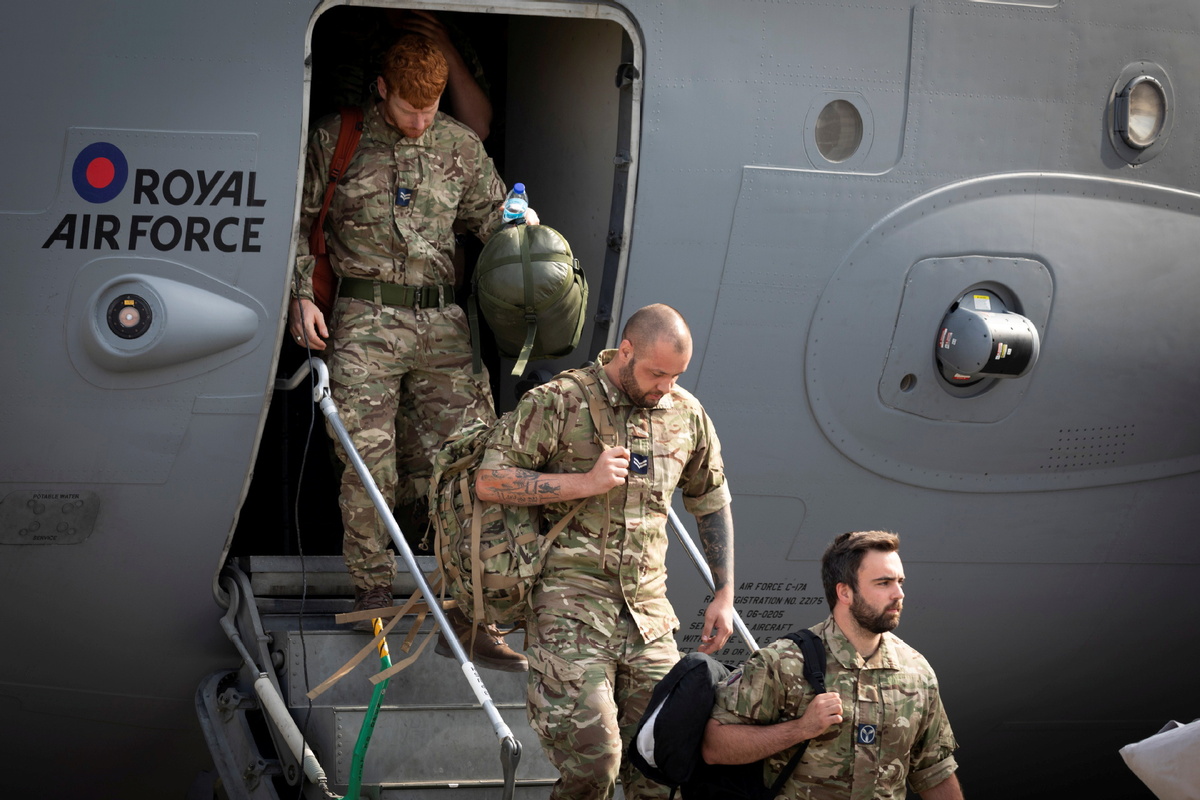
Political infighting within Britain's Conservative Party has intensified following the Afghanistan evacuation effort, which the United Kingdom government has said rescued 15,000 people in two weeks.
The last British troops were pulled out of Afghanistan on Saturday. And the United States forces departed on Monday, after a 20-year military presence in the country.
The UK's place in the world and the government's "Global Britain" policy is under scrutiny, with some backbench members of Parliament saying the chaotic manner of the withdrawal shows the country's foreign strategy is too closely linked to the US.
Among the strongest critics is Tobias Ellwood, the Conservative chair of the House of Commons defense committee, who has said Britain must free itself from "American thinking".
"We should be clear that Britain's leverage is negligible as an individual country following our senseless departure," Ellwood was quoted as saying in the Financial Times on Tuesday.
"Threats of holding back aid funding or introducing sanctions will mean little to the Taliban and only hurt those Afghans in dire need. The only means of influence we now have is if we pool efforts together with the international community."
Ellwood suggested that it was time for the UK to consider "other alliances and coalitions".
"This has to be a soul-searching moment for the party," he said. "We lack resolve and appetite to step forward. Traditionally, if the Americans had hesitated, we would have filled that vacuum. We should not be tied to the political thinking of the White House."
The UK must work with countries that have an influence on the Taliban, including China, Iran, Russia and Pakistan, suggested Peter Ricketts, the UK's former national security adviser, according to the Financial Times report.
Another Conservative member of Parliament told the finance paper that foreign policy needed to be reevaluated because it was "not geared "toward dealing with a crisis.
"This has been a massive reality check for the UK," said the backbench MP. "All this Global Britain energy and what does this say about what it means?"
The MP added that the nature of the Foreign Office "has been very risk-averse."
Britain's foreign secretary, Dominic Raab, is this week taking part in diplomatic talks with G7 counterparts and NATO that are focused on securing safe passage for eligible Afghans out of the country, and on ensuring the nation does not become a base for terrorist groups again.
The UK needs to work with other nations to exercise a "moderating influence" on the Taliban, Raab told BBC Breakfast on Tuesday.
He insisted that "no department has performed better than the Foreign Office and anyone trying to suggest otherwise" either lacked "credibility" or had been "peripheral" to events-and "should be focused on the job at hand".
He added that the next "challenge" was to face Afghanistan's "new reality ... and come up with a plan that reflects it".

KABUL - The Taliban deployed special forces at the Hamid Karzai International Airport in Afghanistan's capital Kabul early Tuesday, hours after the last US forces were evacuated from the airport, a Taliban spokesman confirmed.
The Taliban's Badri special forces have been deployed at Kabul airport. "Security and safety is ensured in the airport," spokesman Zabihullah Mujahid told reporters at the airport on Tuesday.
Aug 31 is the deadline set by US President Joe Biden for the withdrawal of US troops from the Central Asian country.
"We are ready to secure the airport. Everything will be backed to normal soon. The US forces have left a lot of mess at the airport. It is a technical issue and will take time to be solved, and the efforts are underway to restart commercial flights as soon as possible," Mujahid said.
He said Afghanistan has become "completely free and independent" after the US withdrawal.
The Taliban intended to have economic and trade ties with all countries including the United States, Mujahid said, adding "every country can have good relations and ties with Afghanistan."
The final evacuation flight was conducted by the US military on the last hours of Monday night, airlifting the last US troops and non-military personnel back home one day before the Aug 31 deadline.

The withdrawal of foreign forces from Afghanistan should lead to their "reflection and correction", a Chinese envoy to the United Nations said on Monday.
"We hope that relevant countries will realize the fact that withdrawal is not the end of responsibility, but the beginning of reflection and correction," said Geng Shuang, China's deputy permanent representative to the United Nations, at an emergency session of the UN Security Council on the situation in Afghanistan on Monday.
Relevant countries should learn from the lessons, truly respect the sovereignty, independence and territorial integrity of Afghanistan, as well as the rights of the Afghan people to determine their own future, Geng said.
He expressed hope that relevant countries will change the "wrong practice of imposing their own wills on the others", "the hegemonic practices of imposing sanctions", and using force at every turn.
Those countries should be responsible for what they've done in the past 20 years and fulfill their commitment toward the peaceful rebuilding of Afghanistan, Geng said.
"They cannot claim to care about the Afghan people's welfare, while imposing unilateral sanctions, or claim to support Afghanistan's acceleration of economic and social development, while seizing and freezing Afghan's overseas assets," he added.
Those countries have left behind a "huge catastrophe" in Afghanistan. They shifted the blame and responsibility to Afghanistan's neighboring countries and the Security Council, Geng said.
The envoy stressed that the actions taken by foreign troops in the past 20 years, including "the criminal activities carried out by the US and Australia forces for the indiscriminate killing of civilians", must not be wiped out and must continue to be investigated.
The US' recent retaliatory attack on the Islamic State has caused casualties of innocent civilians, Geng said. China calls on the US to refrain from indiscriminately bombing the civilian-populated areas in Afghanistan.
China has always attached great importance to Afghanistan's fight against terrorism, the envoy said, adding that China strongly condemns the recent terrorist attacks in Kabul.
"This terrorist attack in Kabul once again proves that the war in Afghanistan did not achieve the goal of eliminating terrorist forces in Afghanistan," Geng said.
The hasty withdrawal of foreign troops has likely provided opportunities for various terrorist organizations to make a comeback, he said.
China hopes that the security of the Kabul airport could be guaranteed, the evacuation of relevant personnel can proceed smoothly, and all parties concerned can strengthen coordination to jointly prevent a new terrorist attack, Geng said.
Afghanistan must never again become the birthplace for terrorism, or a distribution center for terrorists, which Geng called "the bottom line" that Afghanistan must adhere to in any future political settlements.
China hopes that the Taliban will fulfill their commitment and cut off ties with all terrorist organizations completely, Geng said.
Countries should follow the international laws and the Security Council resolutions to "resolutely crack down" on international terrorist forces such as the "Islamic State", "al-Qaida", and the "East Turkestan Islamic Movement (ETIM)", so as to prevent them from gathering in Afghanistan to cause chaos, the envoy said.
Geng stressed that there should not be any double standard or selective approach on the issue of counterterrorism.
The 15-member council convened Monday afternoon to vote on a draft resolution proposed by the US, UK, and France. The resolution, which urged the Taliban to allow people to leave the war-ravaged country freely, passed with 13 votes in favor. China and Russia both abstained from the vote.
In explaining his vote, Geng said China has "huge doubts" about the necessity and urgency of adopting the resolution as well as the balance of its content. The draft was circulated by its authors Friday evening who demanded action be taken on Monday, he said.
Despite that, China participated constructively in the consultations and put forward important and reasonable amendments together with Russia. However, those amendments "have not been fully adopted", Geng said.
"China has always (been) opposed to imposing or forcefully pushing for resolution by any sponsors. Based on the above consideration, China has abstained from the draft resolution," he said.
Vassily Nebenzia, the Russian Federation's permanent representative to the UN, said he was forced to abstain on the draft resolution vote because its authors have ignored Russia's principled concerns. For one, the resolution did not mention ISIL and ETIM in the paragraph on counterterrorism, he said.
"We interpret it as unwillingness to recognize the obvious and an inclination to divide terrorists into "ours" and "theirs". Attempts to "downplay" threats emanating from these groups are unacceptable," he said.
Nebenzia also called out what he saw as "attempts to shift responsibility for the failure of the 20-year-long presence of the United States and its allies in Afghanistan to the Taliban movement and to the states of the region that will have to deal with the effects of this prolonged campaign".
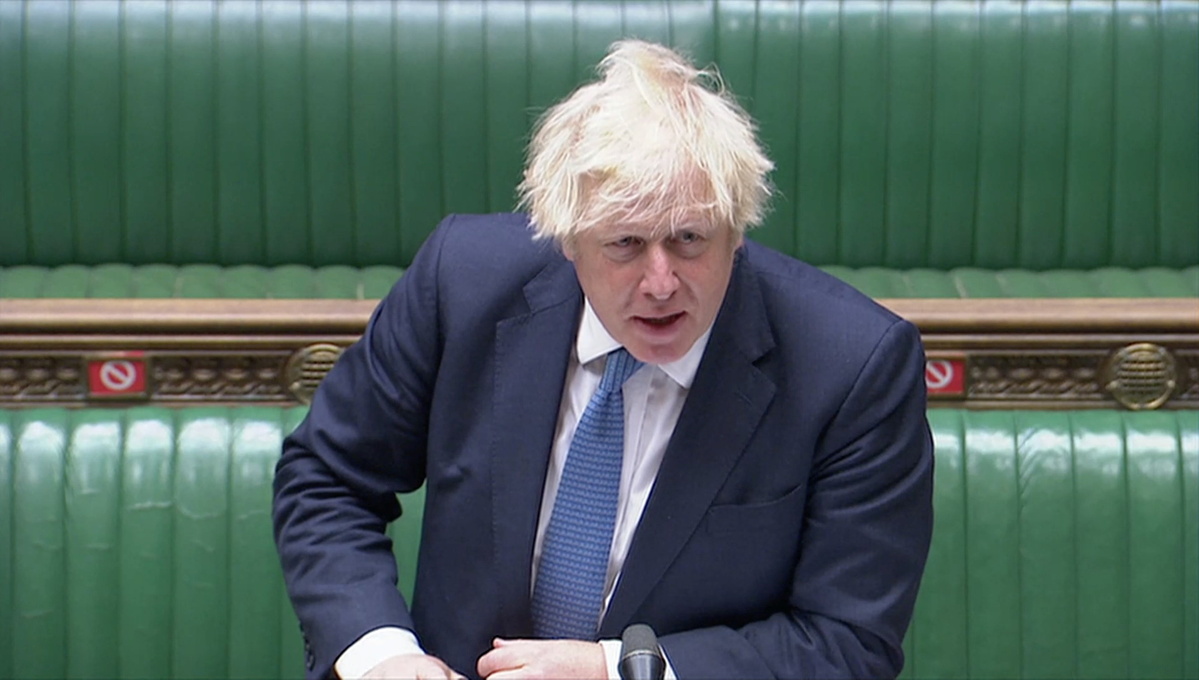
Britain plans to engage with Taliban 'on basis of what they do', says PM Johnson
The United Kingdom is seeking an international agreement on how to deal with the new regime in Afghanistan, and to ensure Taliban movement commits to allowing safe passage for Afghans and foreign nationals who want to leave the country.
After 20 years in Afghanistan, the UK's remaining troops pulled out of the country on Saturday, but it is still unclear how many people are left there who are eligible to come to Britain.
A combined statement published on Sunday by the UK and more than 90 other countries and organizations said assurances about safe passage had been received from the Taliban.
British media reported that most foreign forces stationed at the airport have now left, and the United States is racing to get its last troops out of the country before the Tuesday deadline set by US President Joe Biden.
The UK government has said previously that any decision on how the new regime in Afghanistan would be engaged with would be made in agreement with international partners.
Britain's foreign secretary, Dominic Raab, was due on Monday to take part in talks with representatives from Turkey and Qatar, along with G7 group counterparts and NATO officials, in a US-chaired video meeting, according to the UK's foreign office.
Foreign Office minister, James Cleverly, told BBC Breakfast on Monday that the Taliban would be judged on its actions.
"If (the Taliban) start acting like government, if they start facilitating both internal travel and exiting from Afghanistan, then we will engage with them on that basis," he said.
"But of course what we are not able to do, what no country is ever really able to do, is give an absolute cast-iron guarantee."
The opposition Labour Party shadow foreign affairs minister, Stephen Kinnock, on Monday accused the government of an "unforgivable "failure to evacuate thousands of eligible Afghans.
"We have to now face the reality, unpalatable as it is, that some cooperation is going to be required. What that means is cooperation with conditions," he told the BBC's Today radio program.
Britain's prime minister, Boris Johnson, said on Sunday that the UK and its allies would "engage with the Taliban not on the basis of what they say but what they do". He suggested the Taliban could access frozen bank accounts if it guaranteed refugees would be able to seek asylum abroad.
"If the new regime in Kabul wants diplomatic recognition, or to unlock the billions that are currently frozen, they will have to ensure safe passage for those who wish to leave the country, to respect the rights of women and girls, to prevent Afghanistan from, again, becoming an incubator for global terror, because that would be disastrous for Afghanistan," the Press Association news agency quoted the prime minister as saying.
French President Emmanuel Macron said on Sunday that France, the UK and Germany are working on a United Nation's proposal on how further evacuations might proceed.
Macron said the resolution seeks to establish a safe zone in Kabul to allow safe passage for people trying to leave Afghanistan.
In an interview on the French television channel TF1 on Sunday, Macron said discussions were ongoing to see "how flights could be re-established".
Macron said: "What we have proposed, and what we plan to bring to UN Security Council along with Britain and Germany is a solution that we have used before in other operations, which would involve creating a zone allowing people to arrive at that airport.
"It can mobilize the whole international community, and it also puts pressure on the Taliban."

Moscow welcomes French president's call for 'safe zone' in Afghan capital
Rocket fire apparently targeting Kabul's international airport struck a nearby neighborhood on Monday, the eve of the deadline for the United States' troops to withdraw from its longest war after the Taliban takeover of Afghanistan.
The rockets attached to a sedan were fired toward the airport from Khair Khana Minia locality, according to witness Sayyad Mohammad.
Later, a US official said US antimissile defenses intercepted as many as five rockets early on Monday, Reuters reported.
There were no reports of casualties yet, and no group has claimed responsibility for the attack.
Afghan media said Monday's rocket attack was launched from the back of a vehicle. The Pajhwok news agency said several rockets struck different parts of the Afghan capital.
US officials did not immediately respond to requests for comment. US military cargo planes continued their evacuations at the airport after the rocket fire.
In Washington, the White House issued a statement saying officials briefed US President Joe Biden on "the rocket attack at Hamid Karzai International Airport" in Kabul.
The withdrawal would "continue uninterrupted" at the airport and the president ordered that "commanders redouble their efforts to prioritize doing whatever is necessary to protect our forces on the ground", the statement said.
In Moscow, the Kremlin on Monday welcomed French President Emmanuel Macron's proposal to create a "safe zone" in Kabul to protect humanitarian operations.
"This is certainly a proposal that must be discussed," Kremlin spokesman Dmitry Peskov said, adding that it was "very important" to discuss all aspects of "such a zone".
France and the United Kingdom would urge the United Nations on Monday to work for the creation of this secure area to "allow humanitarian work to continue", Macron said on Sunday.
France ended its evacuation efforts on Friday, Britain did so on Saturday and the US is set to complete its efforts on Tuesday.
The French leader said that such a safe zone would allow the international community "to maintain pressure on the Taliban".
Russia for its part last week airlifted several hundred of its citizens and those of neighboring states as the security situation deteriorated.
Potential threats
President Vladimir Putin has warned that militants could use the unstable situation in Afghanistan to enter neighboring countries under the guise of seeking asylum.
On Sunday, a US drone strike blew up a vehicle carrying Islamic State suicide bombers before they could attack the ongoing military evacuation at Kabul's airport, US officials said. However, the Taliban said the strike killed several people-including civilians and three children, sparking anger over the civilian casualties.
It came after an IS suicide bomb outside the airport on Thursday killed 13 US troops and scores of Afghan civilians.
US Central Command said it was investigating reports of civilian casualties from Sunday's strike.
The drone attack killed seven people, Taliban spokesman Zabihullah Mujahid told China's CGTN on Monday, criticizing the US action on foreign soil as unlawful.
"We condemn such attacks because it is illegal to carry out arbitrary attacks in other countries. If there was any potential threat, it should have been reported to us, not an arbitrary attack that has resulted in civilian casualties," Mujahid said in a written response to a question about the airstrikes.
Meanwhile, a relative of one of the deceased said nine members of one family were killed in the attack, including six children.
"We are not ISIS and this was a family home-where my brothers lived with their families," said the man.
The number of US troops at the airport had fallen below 4,000 over the weekend, and White House national security adviser Jake Sullivan said that the US has the capacity to evacuate them.
He said the US does not currently plan an embassy presence in Kabul after the withdrawal but will ensure "safe passage for any American citizen, any legal permanent resident" after Tuesday, as well as for "those Afghans who helped us".
By Tuesday, the US is set to conclude a massive two-week-long airlift of more than 114,000 Afghans and foreigners and withdraw the last of its troops.
Xinhua and agencies contributed to this story.
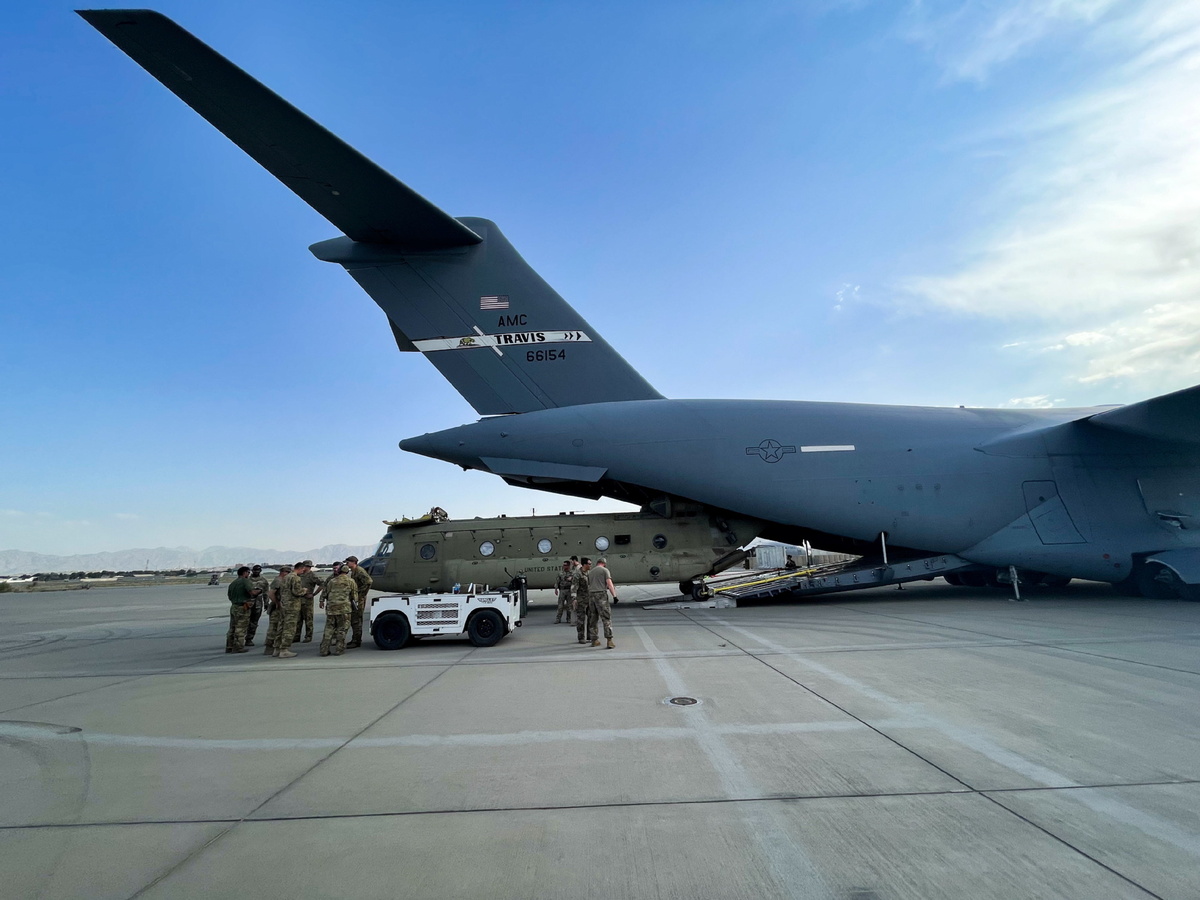
As the United States wrapped up a hectic, bloody, two-week evacuation siege at an Afghanistan airport Monday, the focus will shift to lessons learned from America's longest war and other military involvements.
In announcing the completion of the evacuation and war effort, General Frank McKenzie, head of US Central Command, said the last planes took off from Kabul airport at 3:29 pm Washington time, one minute before midnight in the Afghan capital.
He said scores of American citizens, numbering in "the very low hundreds", were left behind, but he believes they still will be able to leave the country.
The war in Afghanistan — started a month after the Sept 11, 2001, terrorist attacks in the US — has claimed the lives of more than 2,400 Americans. More than 1,100 troops from US-led coalition countries and more than 100,000 Afghan forces and civilians also have died, according to the Costs of War project at Brown University.
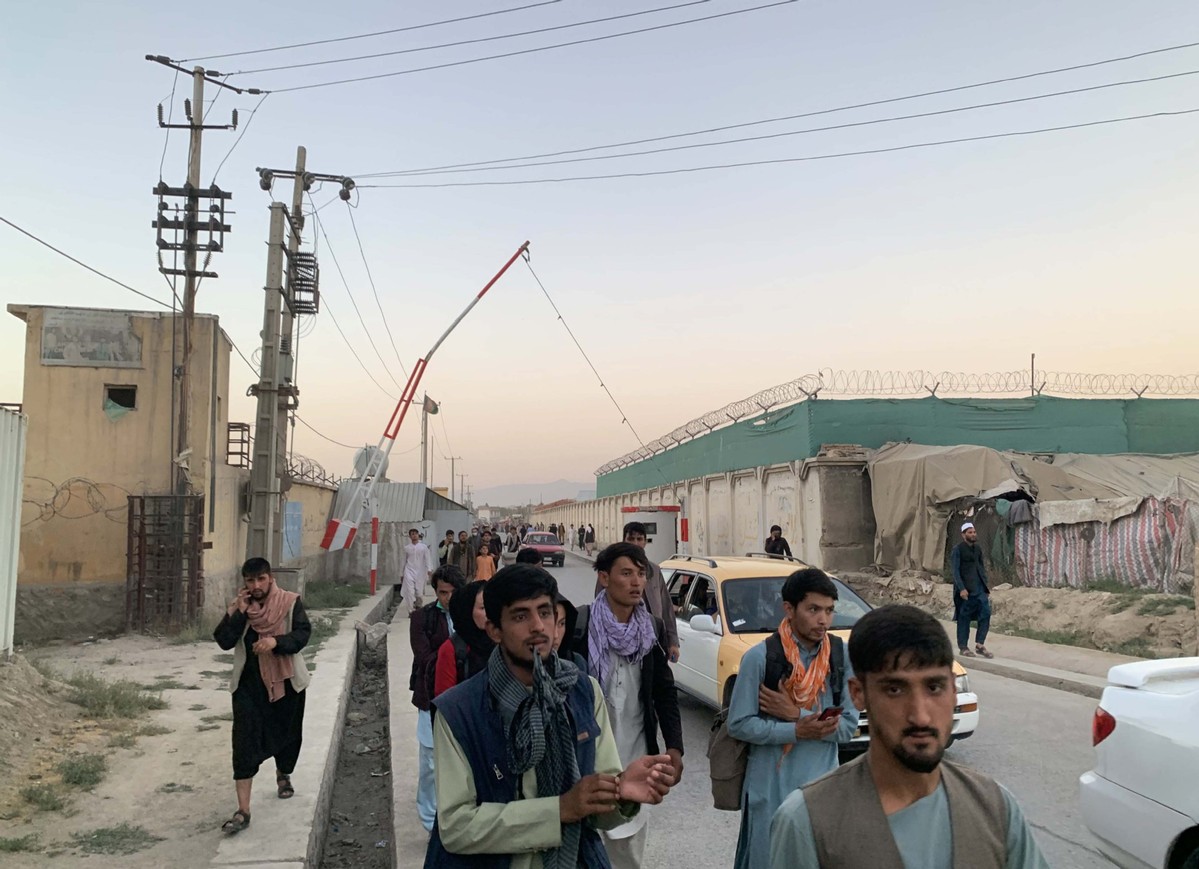
The war's frantic conclusion and purpose are expected to generate much soul-searching and calls for congressional investigations as another US intervention has ended in disarray.
"The US is a democracy where the administration changes every four years — and with it, war strategy," Torek Farhadi, who served as an adviser to former Afghan president Hamid Karzai, told USA Today.
"The result is a mishmash. Nobody knows what the US was doing in Afghanistan for the past 10 years. It hasn't been fighting the Taliban since 2013," said Farhadi, who also has advised the Afghan government on economic policy for the World Bank and the International Monetary Fund.
"The US tolerated corruption in Afghanistan. The American public was too remote from this to really know what is going on," he said. "The Taliban made a comeback amidst this corruption. Consequences for the US are good — it finally cut its loss. But for Afghanistan, the war and the withdrawal will be devastating."
While the US is leaving, it also is leaving behind billions of dollars of sophisticated weaponry, which redounded to the conquering Taliban, an Islamic fundamentalist group, as it swept aside the Western-backed Afghan army over the past two weeks.
Farhadi said that "the war in Afghanistan is much more than a failed intervention. It is stark evidence of how counterproductive global military dominance is to American interests. This military hegemony has brought more defeats than victories and undermined democratic values at home and abroad."
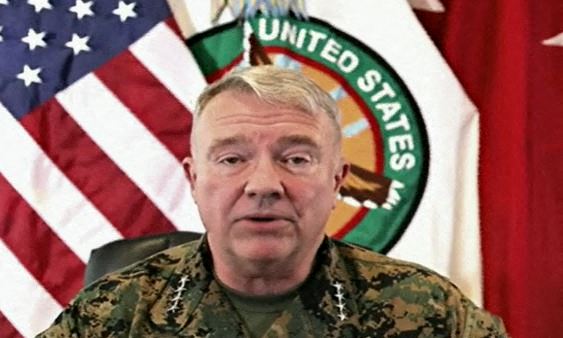
Professor Jeremi Suri, who teaches history at the University of Texas in Austin and at the Lyndon B. Johnson School of Public Affairs, wrote in a guest column in The New York Times: "History is clear: We would be better off with more modest, restrained military and strategic goals. US public opinion seems to have moved in this direction, too. Our country needs to re-examine the value of military dominance."
Suri said that "the reliance on military force has repeatedly entangled the United States in distant, costly, long conflicts with self-defeating consequences — in Vietnam, Lebanon, Iraq, Afghanistan and other places. American leaders have consistently assumed that military superiority will compensate for diplomatic and political limitations."
Mike Bebernes, a senior editor at Yahoo News, wrote that many experts believe that "the most important thing the US should take from its struggles in Afghanistan is a sense of humility. The core mistake of the war, they argue, was the assumption that American values could be imposed on a country as complex and divided as Afghanistan."
Bebernes wrote that "a common belief, especially among former President Donald Trump's allies, is that the war has shown that the US should focus on its own domestic problems and avoid interventionism and nation-building abroad".
He said those opponents argue that the US "has consistently come up short of its goals while causing substantial suffering along the way, with other examples including the Iraq War and more limited engagements in Syria and Libya".
The commencement of the war in Afghanistan was a follow-up to a promise made by then-US president George W. Bush while he stood atop the rubble at Ground Zero in New York City three days after hijackers slammed two airliners into the Twin Towers of the World Trade Center.
"And the people who knocked these buildings down will hear from all of us soon!" Bush shouted through a bullhorn to cheers.
On Oct 7, Bush launched an invasion of Afghanistan. The Taliban's forces were overwhelmed, and Kabul fell soon after.
A US-installed government led by Karzai took over, while Osama bin Laden and his al-Qaida supporters escaped across the border into Pakistan.
Afghanistan was but the first round of Bush's "global war on terrorism". He went into Iraq next, targeting its leader Saddam Hussein, in an invasion of the Middle Eastern country in 2003.
"The best-case scenario is the country (Afghanistan) becomes like Iraq today; the worst-case scenario is it becomes like Syria today. I don't think we know right now what path it's going to take," US Congressman Peter Meijer, a Michigan Republican who deployed to Iraq in 2010 as a member of the US Army Reserve, told axios.com.
The Associated Press contributed to this story.
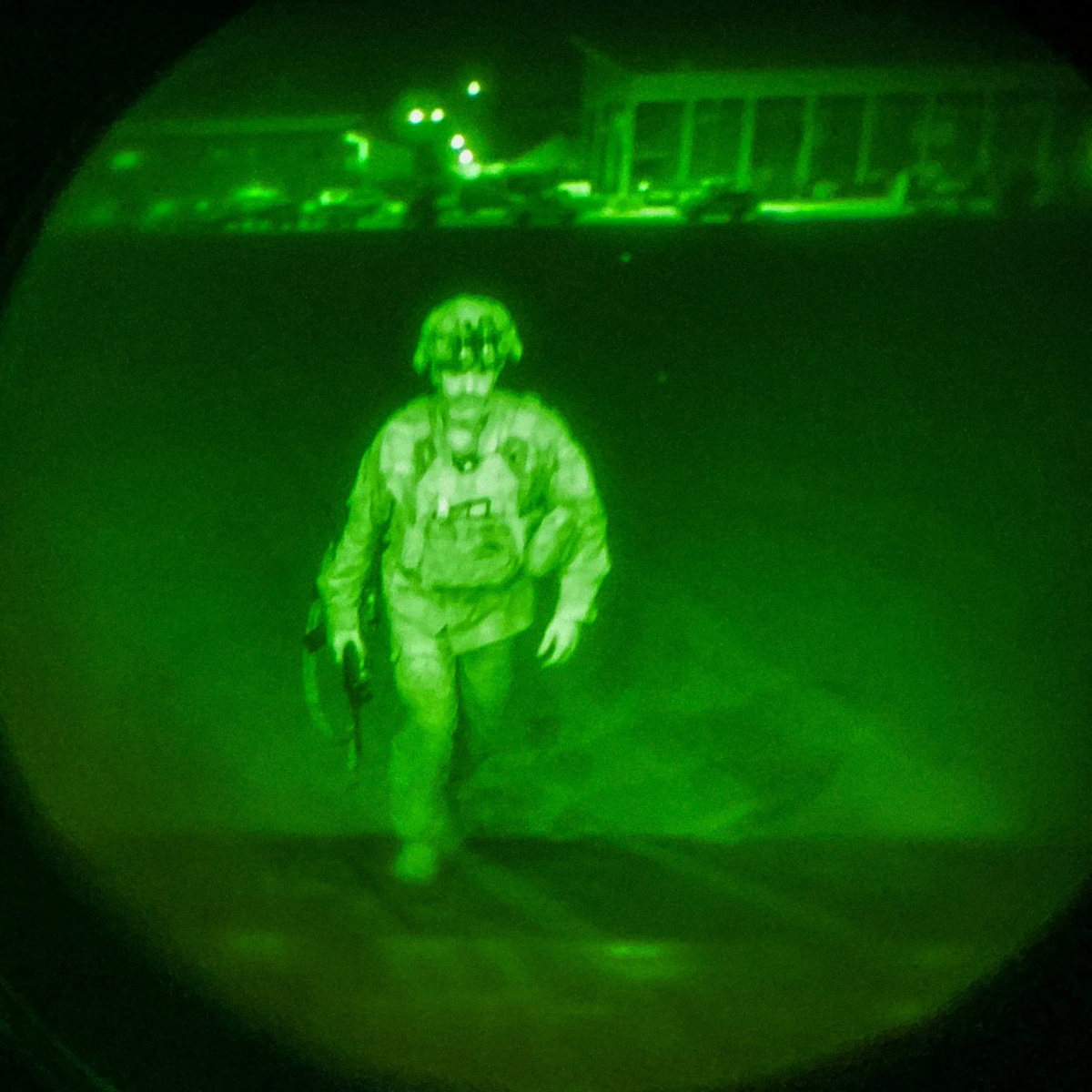
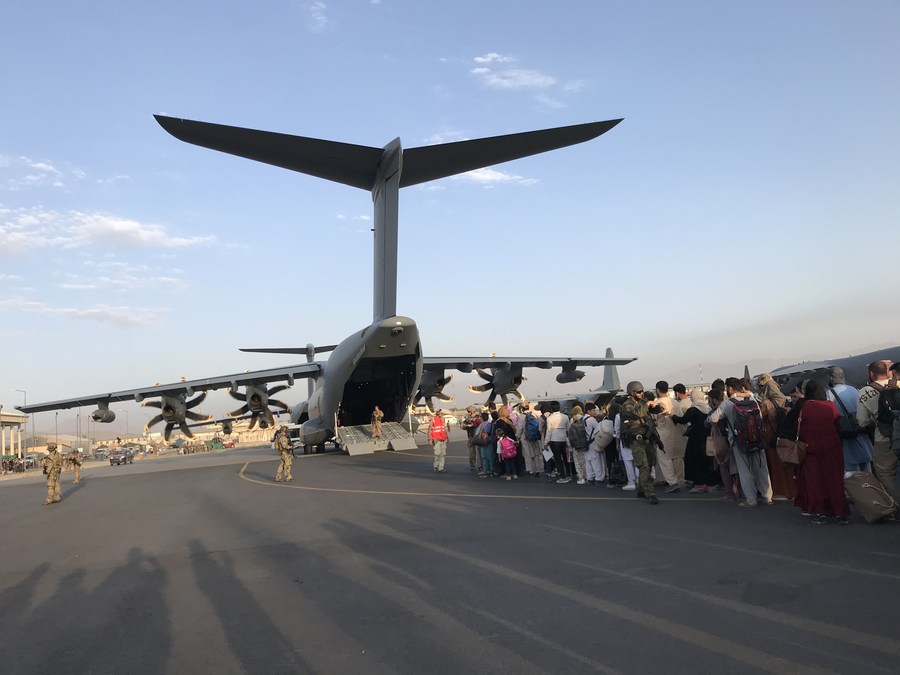
CAIRO - The United States was destined to fail in its twin objectives of withdrawing from Afghanistan and leaving behind a stable, law-based society, after its misguided efforts in the past 20 years, read a recent article published in the Gulf Times.
The United States invaded Afghanistan 20 years ago. Now, with more than 100,000 lives lost and some $2 trillion spent, all America has to show are this month's scenes of a scramble out of the country, said the article titled "Why nation-building failed in Afghanistan" in the Qatari English newspaper on Tuesday.
The article pointed out that while poor planning and a lack of accurate intelligence certainly contributed to the disaster, the problem has in fact been 20 years in the making.
"The assumption is that if you can establish overwhelming military dominance over a territory and subdue all other sources of power, you can then impose your will. Yet in most places, this theory is only half right, at best; and in Afghanistan, it was dead wrong," said the article.
The international community, particularly countries bordering Afghanistan, have "many difficult choices" to make following the failure of the United States' chaotic military intervention there, said a former US assistant secretary of defense.
"The US can walk away; we are 12,000 miles away, and so the mess is there," said Chas W. Freeman, US assistant secretary of defense for international security affairs from 1993 to 1994.
Freeman called the ongoing US withdrawal from a country it invaded 20 years ago a hasty exit that was a result of the wrong sequence of "decision, planning and intelligence".
US President Joe Biden set an Aug 31 deadline for the withdrawal of American military from Afghanistan.
Secretary of State Antony Blinken said Sunday that there are 300 US citizens still in Afghanistan seeking to leave.
They are among about 6,000 US citizens who wanted to leave Afghanistan when the airlift began on Aug 14, one day before the Taliban took over the capital Kabul.
"The countries with the biggest stake in this are the neighbors, not the United States, and so we have handed a problem to Afghanistan's neighbors," Freeman told China Daily in a video interview.
Those neighbors, including China, India and Pakistan, are all concerned about the war-torn nation exporting terrorism and extremism, or providing a haven and training ground for terrorists, according to Freeman, who also served as US ambassador to Saudi Arabia from 1989 to 1992.
State Councilor and Foreign Minister Wang Yi said last week that the US shouldn't simply "take to its heels" or impose sanctions on Afghanistan.
The US should assume responsibility to properly handle the frenetic situation around Kabul airport, provide necessary economic, humanitarian assistance to Afghanistan and help realize a smooth transition in the country through concrete actions, Wang said in a phone call with Dutch Foreign Minister Sigrid Kaag.
Freeman said: "First, none of us want to see terrorists based in Afghanistan, or finding a home in Afghanistan, so we all have that concern."
In addition, he said, everyone has a concern about the narcotics, the heroin produced in Afghanistan, that has a way of crossing over borders rather easily.
The Taliban have appealed for help in substituting crops for poppies — from which heroin and opium are made — which would require countries such as the US, China, Russia and European Union members who are most concerned about the drug trafficking problem to help with agricultural aid and training and provide a commitment to buy the goods to ensure Afghan farmers can make a living, according to Freeman.
A third shared concern of the international community is to prevent extremist ideology from "contaminating neighboring societies", he said.
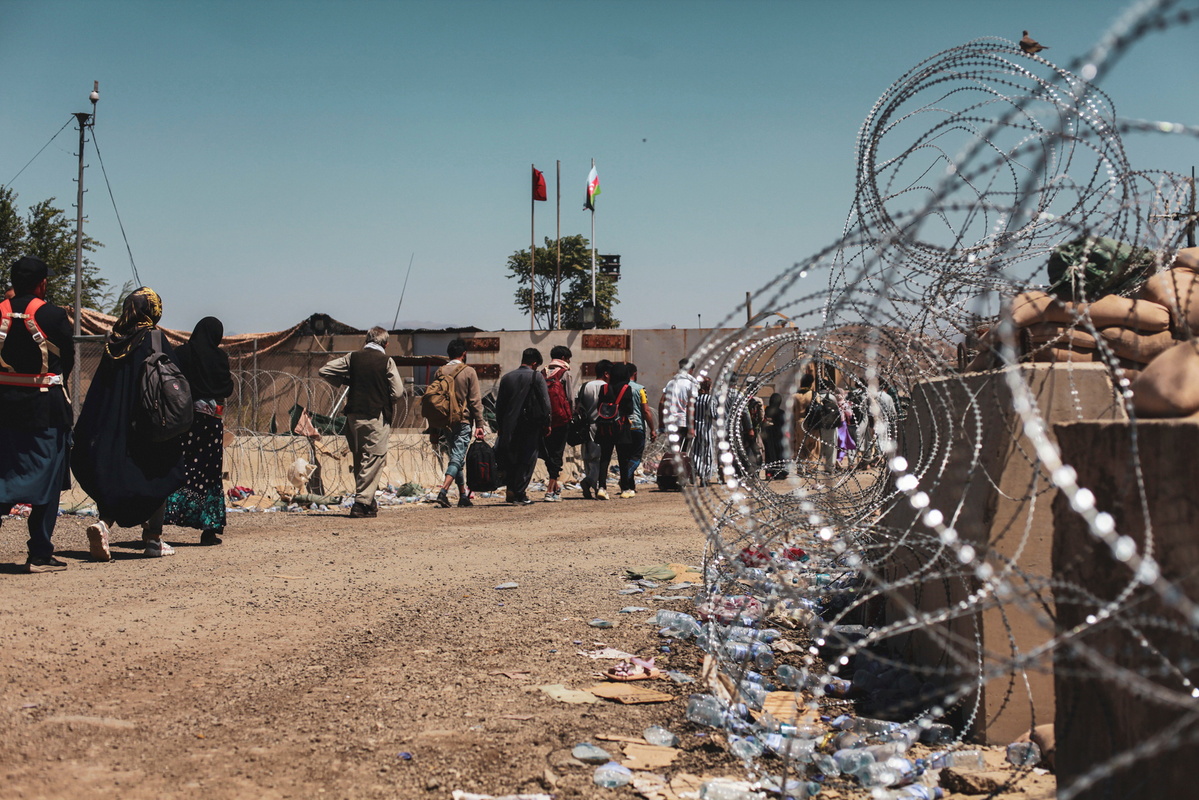
He said that Afghanistan has a "very strong" resistance to foreign intervention and culture and is where "various foreign efforts over the millennia" to change it have failed, starting with Alexander the Great and including Great Britain, the former Soviet Union and the US.
There is no military solution for Afghanistan; everybody who has tried a military solution has failed, Freeman said.
"What has just happened is that the lid has come off the pot; inside the pot is a boiling stew," he added.
The career diplomat said that the original US invasion of Afghanistan 20 years ago had "clear objectives". These were capturing those the US believed were behind the Sept 11, 2001, terrorist attacks and ousting a regime that was accused of providing shelter to terrorists.
"They were accomplished really within six weeks. That was enough, we should have left. People were never able to accurately, precisely explain why we were still fighting in Afghanistan," he said. "If you fight a war and you don't know what the purpose of the war is, you're going to fail."
Last February, Freeman pointed out that the "ill-considered" US pacification campaign in that fractious country had failed. "There has been neither clarity nor fixity about our objectives there," he said in a speech at the Watson Institute for International and Public Affairs, where he serves as a senior fellow.
In the interview, Freeman analyzed what he believed was the "going backward" policy decision process regarding the US' Afghanistan move.
Biden decided to withdraw US troops in line with the agreement that his predecessor Donald Trump had negotiated and then he asked the military to plan.
What the military did was plan for force-protection, that is, for the safety of the troops as they withdrew.
This is why they closed Bagram Air Base, which would have been essential for the kind of evacuation that is going on now at Hamid Karzai International Airport in Kabul, according to Freeman.
"So first came the decision, then came the planning, and only last came the intelligence assessment. This is all backwards," he said. "So, I think the contingency planning that was done, for the most part, did not focus on the right issue, which is the turmoil."
There are "mixed" consequences of the US failure in Afghanistan, he said. It shows that the US was "obstinate", keeping going even when it made no sense, and that American reliability is in doubt, with people thinking the US can't be depended upon, even though it stayed in Afghanistan for 20 years.
"Another result is that other countries will increase their efforts at self-defense. That is, because they want to hedge. They want to protect themselves against an American failure to come to their rescue," he said.
There are usually three criteria for recognition of a government: if it is in effective control of its territory, if it has agreed to keep its international obligations, and if it isn't causing a huge problem for its neighbors, according to Freeman.
"The United States adds another one, which is, 'Do we like them or not?'" he said. "We should recognize the reality. They have won the civil war; despite our help for their opponents, we have to live with that."
As to "the most effective way to influence the Taliban", Freeman said it is engagement with them, not disengagement, ostracism, isolation or cutting them off from funding.
Washington dismissed any chance of rapid recognition for a Taliban government and said it has not decided yet if it will maintain a diplomatic presence in Afghanistan after the troop withdrawal.
"I want to be really clear: there's no rush to recognition of any sort by the United States or any international partners we have talked to," White House spokeswoman Jen Psaki said at a briefing on Friday.

More than 170 deaths from the terrorist attack near Kabul airport last week not only highlighted the humanitarian crisis created by the United States and its NATO allies but also marked the failure of 20 years of US-led invasion into another sovereign nation, analysts say.
With the deadline for evacuations of Tuesday looming, the chaotic evacuation from Afghanistan has become "extremely fluid", but "fragile and complex at the same time", said Amina Khan, director of the Centre for Afghanistan, Middle East and Africa at the Institute of Strategic Studies in Islamabad.
And it was unfortunate that people were having to brace for more terrorist attacks because ISIS-K, which claimed responsibility for Thursday's attack, "has always caused violence and attacks in times of relative peace", she said.
The ISIS had disrupted limited ceasefires that took place between the Taliban and the then Ashraf Ghani government in 2018, 2019 and last year, she said.
In a Pentagon briefing on Saturday, US Army Major General Hank Taylor said: "Two high-profile ISIS targets were killed, one was wounded, and we know of zero civilian casualties."
Taylor, deputy director of the Joint Staff For Regional Operations, also told reporters that the blast at the Abbey Gate of Kabul airport involving a sole suicide bomber was the only attack that happened on Thursday, correcting earlier reports that a second attack was launched at the adjacent Baron Hotel, Xinhua reported.
Salman Bashir, former foreign secretary of Pakistan and a former ambassador to China, had called the ISIS-K attack on Kabul airport "deplorable".
The US had sent troops to the country two decades ago in the name of fighting terrorism, only to fail in its goal in countering terrorism, leaving such problems and chaos behind.
"This and all other terrorist organizations need to be eliminated and the international community should join efforts in this regard," Bashir said. "The perpetrators of this attack must be punished."
Khan said that contributing to the chaos in Afghanistan is that more than a dozen terrorist groups, large or small, are reported to be operating, and the US should question their motives and strategies.
In addition to Thursday's explosion, there was continuing chaos including gunfire, overcrowding and stampedes at the airport as large numbers of people tried to get out of the country regardless of whether they held passports or other travel documents.
Khan said it is unfair of US officials or others to blame the Taliban for the chaos, because they had said clearly time and again that people should avoid the airport and had expected attacks from the ISIS.
"As we are all aware, the international troops, primarily the Americans, are in charge of security within the airport, and outside the airport is the Taliban," Khan said. "But I think it's very difficult to vet the thousands of people that are flocking to the airport."
The Taliban had repeatedly said they were "not in favor of allowing Afghans to leave".
"Now everybody's looking at emerging evacuation flights as a lifetime opportunity to flee from adversity into what they believe as a land of opportunity," said Imtiaz Gul, executive director of the Center for Research and Security Studies in Pakistan.
Many people in Afghanistan are young people tired of fighting and explosions and frustrated by non-employment and the unstable life, he said.
It is estimated that 80,000 Americans and Afghans who once worked for the US government were to be evacuated from Kabul airport.
"All these people have been very desperate," Gul said. Many of those who had chosen to leave were professionals educated in the West who had returned to the country, and their departure raises concerns of a brain drain that will adversely affect the country's rebuilding, he said.
Bashir warned that in some quarters there are those "who do not want stability and peace in Afghanistan and are playing spoiler by proxy attacks. It is therefore necessary that the root cause of terror be correctly identified and the spoilers should be isolated and made to desist."
To solve the humanitarian crisis at the airport, Bashir said, Afghans need the support of the world, and the Western world should accept its responsibility for creating a situation leaving people homeless.
KABUL - A rocket was fired at the Kabul airport in Afghanistan where the US-led evacuation flights were continuing but failed to hit the target, a witness told Xinhua on Sunday.
"The rocket struck Khwaja Bughra, a populated residential area in Police District 15, in the west of the Hamid Karzai International Airport roughly at 4:55 pm local time. Casualties are feared," witness Ghulam Hazrat said.
A thick gray smoke was seen rising above the site. No group has claimed responsibility for the attack yet.
Any big bang causes panic among the war-weary Kabul residents.
On Thursday, a deadly suicide bomb blast and gun firing claimed by ISIS-K, a local affiliate of the Islamic State group, killed 170 Afghans and 13 US troops at an eastern gate of the Kabul airport and injured nearly 200 others.
Dozens of planes, including military planes, took off from the airport since early Sunday. All US and coalition forces are expected to leave the country on Aug 31, a planned deadline.

KABUL - The US and coalition forces have handed over control of three gates, including the entrance to the military section, of Kabul's airport, to Taliban members, a Taliban official told local media Sunday.
"The US troops are in control of a small part of the airport, including an area where the radar system of the airport is located," Enhamullah Samangani told Tolo News TV.
Taliban deployed a unit of special forces at the main gate of the airport about two weeks ago.
"We are ready to take over the security and technical responsibility of the airport," he said.
The takeover came after a deadly suicide bomb blast and gun firing claimed by ISIS-K, a local affiliate of the Islamic State, killed 170 Afghans and 13 US troops at an eastern gate of the facility on Thursday.
Earlier a Taliban official reportedly said that the Taliban's special forces, and a team of technical professionals and qualified engineers were ready to take over all charges of the airport after the departure of the US forces.
Dozens of planes, including military planes, took off from the airport since late Saturday. Most of some 6,000 US and coalition forces and a unit of Afghan Special Forces who were deployed to the airport before the Taliban's takeover of Kabul on Aug 15 had reportedly evacuated.
All US and coalition forces are expected to leave the country on Aug 31, a planned deadline.

WASHINGTON - The Pentagon said on Saturday that two high-profile targets of ISIS-K, a local affiliate of the Islamic State in Afghanistan, were killed in a US drone strike on Friday.
"Two high-profile ISIS targets were killed, one was wounded, and we know of zero civilian casualties," US Army Major General Hank Taylor told reporters in a Pentagon briefing.
US Central Command initially assessed on Friday that the drone strike, which occurred in Nangarhar province of eastern Afghanistan, killed one ISIS-K planner.
The strike came after a suicide bombing outside Kabul airport on Thursday which killed 13 US service members and some 170 Afghans. ISIS-K had claimed responsibility for the attack.
Pentagon Press Secretary John Kirby said in the briefing that the US military supporting evacuation had begun its withdrawal from Kabul airport.
President Joe Biden set Aug 31 as the deadline to end US military mission in Afghanistan.
The United States has been scrambling to evacuate Americans and its Afghan partners from the country since the Taliban entered Kabul on Aug 15. The White House said on Saturday around 111,900 people had left Afghanistan since Aug 14.

KABUL -- The Taliban has called upon Kabul residents to hand over government vehicles, arms and ammunition if those assets have been left with them, according to Taliban spokesman Zabihullah Mujahid.
All those living in Kabul are informed "to return all government assets including vehicles, arms and ammunition or any other things", Mujahid said in his Twitter account on Friday night.
To back the Taliban call for returning the government assets, prayer leaders in their sermons have also urged people to hand over government assets if they have kept the assets with them.
Conveying the Taliban messages, the prayer leaders have also called on government employees to return to their offices and resume their work normally.

WASHINGTON - The United States has launched a drone attack against a planner for the Islamic State (ISIS), the US Central Command said Friday, less than 48 hours after a suicide bombing in Kabul, Afghanistan, killed 13 US service members and some 170 Afghans.
"US military forces conducted an over-the-horizon counterterrorism operation today against an ISIS-K planner," US Central Command Spokesman Bill Urban said in a statement, referring to the terror group affiliated to ISIS that claimed responsibility for Thursday's bombing at Kabul's Hamid Karzai International Airport.
"The unmanned airstrike occurred in the Nangahar Province of Afghanistan. Initial indications are that we killed the target. We know of no civilian casualties," the statement said.
US officials have warned of heightened terror threats to US troops in the aftermath of what was one of the deadliest attacks in the 20-year US-led invasion in Afghanistan.
Pentagon Press Secretary John Kirby told a news conference Friday that "specific credible threats" are believed to exist, "and we want to make sure we're prepared for those" threats.
White House press secretary Jen Psaki echoed the concern over those security threats, saying in a press briefing that American officials believe "another terror attack in Kabul is likely."
Also on Friday, Major General Hank Taylor, deputy director of the Joint Staff For Regional Operations, clarified to reporters that the blast at the Abbey Gate of the Kabul airport involving a sole suicide bomber was the only attack that happened Thursday, correcting earlier reports that a second attack was launched at the adjacent Baron Hotel.
"I can confirm for you that we do not believe that there was a second explosion at or near the Baron Hotel; that it was one suicide bomber," Taylor said. It was not clear the individual killed in the US airstrike was specifically involved in Thursday's bombing.
The US reprisal came after President Joe Biden promised to strike those responsible for the suicide bombing.
Related: Terrorist attack brings more uncertainty to Afghan situation

Europe finds itself under great pressure to shoulder the burden of the US' debacle
The United States' hasty withdrawal in Afghanistan not only produced a large number of refugees with an unknown future, but it has also left its European allies struggling to deal with the imminent wave of refugees.
The Kabul International Airport, which is located 5 kilometers from the city center, has been in utter chaos since the Taliban entered the capital Kabul on Aug 15, with thousands of Afghans in hope of leaving the country crowding the perimeter of the airport.
However, as the initiator of the chaos and the one responsible for the current worsening refugee crisis in Afghanistan, experts said the US is trying to distract people's attention by calling on allies to accept a large amount of refugees.
About half a million Afghans have been internally displaced by violence this year alone, with the vast majority of Afghans unable to leave the country through regular channels, according to a statement by the United Nations High Commissioner for Refugees.
Facing a large Afghan refugee inflow, the US cannot accept them on a large scale, with its domestic economy under great pressure and the government also facing criticism domestically on the Afghanistan issue, said Zou Zhiqiang, a researcher at the Center for Middle Eastern Studies at Fudan University.
"The US can easily restrict the inflow of refugees from the Middle East by relying on its geographical advantages, and force European countries to face greater pressure and shoulder the burden," he said.
This situation is similar to the Syrian civil conflict, which created a refugee crisis that has not been handled well to this day.
"This time, the US once again called on its allies to accept refugees and the international society to share the responsibility," Zou said. "This is fundamentally a way of evading its own responsibility."
Principle of responsibility
Refugees include those displaced by the war, translators and logistics personnel hired by the US military, and people who want to leave Afghanistan due to economic factors.
But the US said it would only receive about 10,000 Afghan employees who have served the US military.
Ding Long, a professor from the Shanghai International Studies University, said a principle of "whoever causes the trouble is the one responsible" should be followed when assisting Afghanistan, though the international community can also provide humanitarian aid.
"As the instigator and the country directly responsible for the chaos in Afghanistan, the US, as well as the Western countries, can't just leave the mess to the Afghan people and neighboring countries," he said.
"This will make Afghanistan's independence and self-reliance even more distant in the foreseeable future, and put a heavy burden on the regional security and development."
European Commission President Ursula von der Leyen on Aug 21 urged all countries, especially European ones, to take in some refugees.
However, Zou said more European countries would be unwilling to accept large numbers of Afghan refugees due to a recurrence of the refugee crisis.
French President Emmanuel Macron stressed that Europe alone cannot shoulder the consequences of the situation in Afghanistan, and must anticipate and protect themselves against significant irregular migratory flows.
Given that Western countries are unwilling to accept large numbers of refugees, Zou said it is possible for these countries to provide money to neighboring or third countries so as to host resettlement of refugees to avoid a larger refugee flow.
Turkey has expressed concern and said it could not bail out the European Union by taking in Afghans who worked for Western countries in Afghanistan.
"You cannot expect Turkey to take on the responsibility of third countries," said President Recep Tayyip Erdogan on Aug 22, adding that his country is hosting around 5 million refugees and "cannot support an additional migratory burden".
Agencies contributed to this story.

The daily chaotic scenes of evacuation at Afghanistan's Kabul airport turned into scenes of death and maimed survivors on Thursday as a suicide bomber killed at least 79 Afghans and 13 US troops, bringing more uncertainty and risks to the war-torn land.
The United States said on Friday that a deadly attack at the gate to the airport on Thursday was carried out by one suicide bomber, not two.
"I can confirm for you that we do not believe that there was a second explosion at or near the Baron Hotel, that it was one suicide bomber," Army Major General William Taylor told Reuters.
The Islamic State terrorist group claimed responsibility for the attack, injecting further panic into the final days of an already frenzied US-led airlift.
Taliban spokesman Suhail Shaheen said in a message: "We strongly condemn this gruesome incident and will take every step to bring the culprits to justice."
China on Friday condemned the attack at Kabul airport, saying it is ready to work with the international community to address the threat of terrorism and prevent Afghanistan from becoming a source of terrorism again.
Foreign Ministry spokesman Zhao Lijian said at a daily news conference that the attack showed the security situation in Afghanistan remains complicated and severe. Relevant sides should take effective measures to ensure a smooth transition of the situation there and the safety of the Afghan people and foreign nationals in Afghanistan.
Zhao noted that no Chinese people were killed or injured in the attack.
He also reiterated China's concerns over the East Turkestan Islamic Movement, an international terrorist organization listed by the United Nations Security Council that constitutes a direct threat to the security of China.
US President Joe Biden and General Frank McKenzie, the US general overseeing the evacuation of Afghans, US citizens and others, said that the attack wouldn't halt the US-led airlift.
"We are continuing to bring people onto the airport," McKenzie said at the Pentagon a few hours after the explosion. "The plan is designed to operate under stress."
He also noted that there were still around 1,000 US citizens in Afghanistan.
US Defense Secretary Lloyd Austin said that "we will not be dissuaded from the task at hand", a reference to evacuations from Kabul airport before the Aug 31 deadline set by Biden to leave the Taliban-controlled country.
On Friday morning, some evacuation flights resumed with queues of people seen lining up on the tarmac, but there were no more crowds near the sites of the blast.
The United Kingdom and Spain announced their evacuation operations would end on Friday, after Canada and Australia had already stopped their flights.
The overall organization of the US withdrawal is "very chaotic and hasty", giving terrorists an opportunity to take advantage of the situation to create more chaos, said Dong Chunling, a research fellow at the China Institutes of Contemporary International Relations.
"In the past two decades, Afghanistan has not solved the fundamental problems of domestic power fragmentation, people's livelihoods and well-being that easily lead to the breeding of terrorism," he said. "After the withdrawal, the situation in Afghanistan is more like a pile of dry firewood, which can be ignited by terrorists."
US President Joe Biden said that he had instructed the US military to develop plans to strike IS.
However, Dong said if the breeding ground for terrorism cannot be eliminated fundamentally, the war on terrorism can only be counterproductive.
"In the past two decades, the US has played a leading role in the anti-terrorism war. But the current chaos shows that the country has made mistakes at the strategic level," he said. "If the US does not change its behavior, including pursuing hegemonism and creating clashes of civilizations, the future anti-terrorism situation will not improve."
Agencies contributed to this story.
